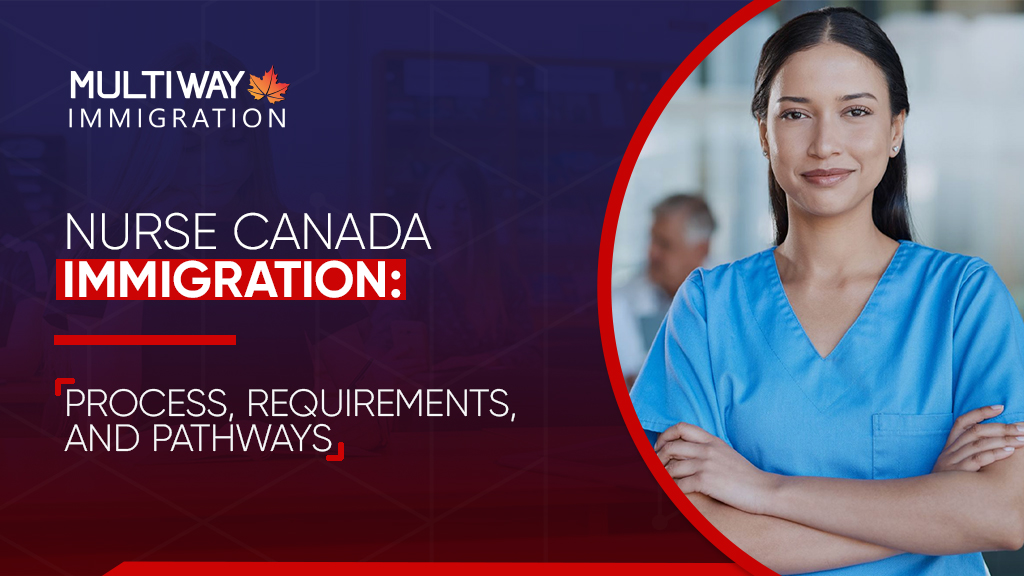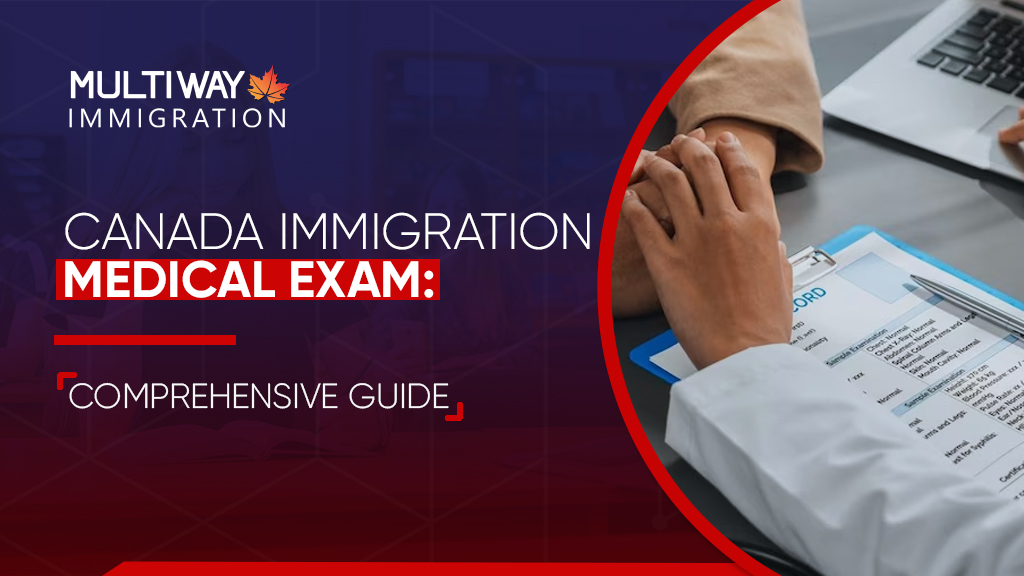Nurses play a crucial role in Canada’s healthcare system, especially during the recent pandemic, where there’s a growing need for skilled nurses. As a nurse trained abroad or with experience, nurse Canada immigration offers great opportunities.
The Canadian government actively seeks to address the nursing shortage by welcoming qualified nurses to contribute to their healthcare services.
If you’re a qualified and experienced nurse aiming for permanent residency in Canada, now is an excellent time. There are different ways to apply for Canada PR as a nurse through Trusted Immigration Services at the federal and provincial levels.
Canada needs nurses in various roles, such as coordinator, licensed practical nurse, registered nurse, supervisor, nurse aide, or dental nurse. Programs like Provincial Nominee Programs and Express Entry help make the immigration process smoother for skilled and semi-skilled immigrants who can significantly contribute to Canada’s economy.
Types of Licenses in Nurse Canada Immigration
In Canada, nursing is a regulated profession, meaning you need to get a license from your province or territory before working as a nurse. Most provinces allow you to start this process even before arriving in Canada.
There are three main types of nurse Canada immigration licenses based on education, skills, and job duties:
- Nurse Practitioner (NP): To get an NP license, you usually need a master’s degree in nursing or an advanced nursing credential with a specialization in adult, pediatric, or primary healthcare. Experience as a registered nurse is also required. Sometimes, an NP license is an extension of the RN license, so you might need first to be eligible for or registered as an RN.
- Registered Nurse (RN) and Registered Psychiatric Nurse: An RN license generally requires a bachelor’s degree in nursing. If your degree is over three years old, you might need to show recent nursing practice. The licensing process for Registered Psychiatric Nurses may be different in certain provinces like British Columbia and Alberta.
- Licensed Practical Nurse (LPN, or Registered Practical Nurse): To get an LPN license, you typically need a nursing diploma. Similarly, if your diploma is more than three years old, you may need to show recent nursing practice.
The names of these licenses might vary by province, and there could be entry-level licenses for nursing students or recent graduates. In some provinces, like British Columbia and Alberta, the process for licensing Registered Psychiatric Nurses might be different from that for RNs.
For those navigating the nurse Canada immigration process, seeking guidance from a Canada Immigration Consultant or an Immigration Consultant Edmonton can be incredibly beneficial.
In-Demand Occupations for Nurses
- Nurse Supervisors, also known as Nurse Managers or Nurse Administrators, are responsible for overseeing nursing staff, managing administrative tasks, coordinating patient care, and ensuring the smooth operation of healthcare units or departments. They often provide guidance, support, and leadership to nursing teams.
- Registered Nurses (RNs) are highly trained healthcare professionals who provide patient care, administer medications, perform medical treatments, and collaborate with other healthcare professionals. They work in various healthcare settings such as hospitals, clinics, long-term care facilities, and community health centers.
- Dental Nurses (Dental Hygienists and Therapists), including Dental Hygienists and Therapists, work alongside dentists to assist in patient care, perform oral health assessments, take X-rays, and provide preventive dental care and education to patients.
- Nurse Practitioners are advanced practice nurses who often perform duties similar to physicians, including diagnosing and treating illnesses, prescribing medications, and providing primary and specialized healthcare services. They may specialize in areas such as pediatrics, family medicine, or mental health.
- Allied Health Professionals work in various healthcare roles that support patient care but are not typically classified as nurses or doctors. This can include roles like medical technologists, respiratory therapists, occupational therapists, physical therapists, and other specialized healthcare professions.
- Licensed Practical Nurses (LPNs) provide basic nursing care under the supervision of registered nurses and doctors. They assist in patient care, administer medication, monitor vital signs, and perform other essential healthcare tasks in various healthcare settings, such as hospitals, long-term care facilities, and clinics.
Primary Routes for Nurses Immigrating to Canada
-
Express Entry
Express Entry stands as a major program managing permanent residency applications. Nurses can seek entry under the Federal Skilled Worker Program, with specific eligibility criteria.
This program uses a competitive selection system based on the Comprehensive Ranking System (CRS) score. If you’re a nurse with relevant qualifications, work experience, and language proficiency, your chances of selection for Canada PR increase.
Nurses are eligible for Express Entry under the Federal Skilled Worker Program (FSW) or Canadian Experience Class (CEC), given they meet program requirements. For FSW, candidates need at least one year of recent skilled work experience within the past decade, even if gained abroad.
Qualified candidates can submit a profile to the Express Entry pool and receive a CRS score out of 1,200. High-scoring candidates receive Invitations to Apply (ITAs) for permanent residence.
Express Entry offers a swift process. Once invited to apply for permanent residence, applications can be processed in as little as six months!
The language score required for nurses in Express Entry depends on their profile. They need a minimum Canadian Language Benchmark (CLB) of 7.0 in English or French across four competencies. Additionally, applicants must score at least 67/100 on a six-factor test evaluating education, language skills, and job prospects in Canada.
-
Provincial Nominee Program
Another viable pathway for nurses to obtain Canada PR is through Provincial Nominee Programs (PNPs). Canadian provinces like Nova Scotia, Alberta, Manitoba, British Columbia, Saskatchewan, and Ontario have a high demand for skilled nurses.
Each PNP is unique, tailored to the specific needs of the province. PNPs offer swift pathways to Canada PR for skilled or semi-skilled individuals.
Here are some top PNP pathways for nurses:
Ontario: The Ontario Human Capital Priorities Stream invites nurses to apply.
British Columbia: Provides a Healthcare Professional category under BC PNP’s Skills nurse Canada immigration and Express Entry categories.
Saskatchewan: Launched the International Health Worker Expression of Interest (EOI) pool for nurses.
Nova Scotia: Holds occasional NSNP draws specifically for nurses through the Labour Market Priorities Stream.
New Brunswick: Runs the Internationally Educated Nurses (IEN) program, ideal for foreign-trained nurses proficient in English or French.
Alberta: Offers the Alberta Express Entry and Alberta Opportunity streams.
PNPs serve as a key route to Canadian permanent residence. Some PNPs are accessible only to candidates already in the Express Entry pool. Obtaining a nomination from these PNPs provides an additional 600 CRS points, almost ensuring an Invitation to Apply (ITA).
Certain PNPs require a connection to the province, like having family there or prior experience in the province. Other PNPs target skill shortages by accepting workers with in-demand occupations.
For instance, Nova Scotia’s Labour Market Priorities stream and Ontario’s Human Capital Priorities Stream often invite nurses to apply for nomination but require an invitation from the province to apply.
-
Quebec Immigration
Nurses may also qualify for the Regular Skilled Worker Program (QSW) based on their score in the Quebec selection grid.
Eligible candidates can create a profile on Quebec’s Arrima portal, which uses its own points system for ranking. Quebec conducts regular draws through Arrima, inviting candidates to apply for permanent selection. Nurses are frequently targeted in these draws. The Regular Skilled Worker Program (RSWP) empowers Quebec to invite applicants possessing the skills, training, experience, and language abilities to work and settle in the province.
Individuals in all occupations can express their interest under the RSWP. Selection is based on various factors like age, proficiency in French and English, work experience, education, and more. If chosen, you receive a Quebec Selection Certificate (known as Certificat de sélection du Québec or CSQ) and can apply for PR through IRCC.
For those seeking Canada Family Sponsorship or guidance through the immigration process, consulting a reputable Canada Immigration Agency could be immensely helpful. They can offer advice and assistance throughout the Nurse Canada immigration journey.
How to Get Licensed in Canada as a Foreign-trained Nurse
Getting licensed as a foreign-trained nurse in Canada involves several steps, often starting with the National Nursing Assessment Service (NNAS) application. Here’s a simplified guide:
Registration with the National Nursing Assessment Service (NNAS)
As an internationally educated nurse seeking an RN, RPN, or LN license in Canada, you typically begin with an online NNAS application:
- Create an account and start the application: Choose a nursing category and a specific province, pay the main application fee of $650 plus taxes, and complete your application within 12 months.
- Provide identification documents: Submit notarized copies of two ID documents, including one photo ID like a passport or driver’s license.
- Submit nursing education details: Send forms to the international institutions where you studied nursing. They need to provide completed forms, academic transcripts, and course descriptions directly to NNAS. No separate Educational Credentials Assessment (ECA) is necessary for internationally qualified nurses.
- Provide nursing registration and employment history: Forms need to be sent to licensing authorities and previous employers, who will complete and send them to NNAS directly.
- Submit language test results: If your first language isn’t English or French, you may need to take an approved language test (e.g., IELTS, CELBAN, TEF). However, if you studied nursing in English/French in a country where these are the primary languages, you might not need to submit language test results.
Note: You can’t directly submit education, registration, or employment forms to NNAS. They may charge a translation fee if documents aren’t in English or French.
NNAS Assessment
NNAS assesses your foreign nursing credentials, reviews your identification documents, work experience, and language test results. Upon completion, NNAS prepares a report on your nursing background and sends it to your provincial regulatory authority.
This process aims to evaluate your qualifications and experience to align with Canadian standards for nursing licensure.
For those considering Canada Immigration Services, seeking a Canada Work Permit, or exploring how to Immigrate to Canada as a nurse, consulting with nurse Canada immigration professionals or agents experienced in healthcare immigration can provide guidance through this licensing journey.
Why Trust Multiway Immigration
At Multiway Immigration, the Best Immigration Consultants for Canada, we specialize in supporting healthcare professionals, particularly nurses, through the Targeted Express Entry process. Our team of experts comprehends the unique needs of nurses within the Canadian healthcare system and is dedicated to boosting your chances of receiving an Invitation to Apply (ITA).
We’ll assess your Express Entry profile and pinpoint areas that can be improved to increase your CRS score. Our skilled consultants will assist you in optimizing your work experience, education, and other factors to ensure your profile meets the specific criteria of the Targeted Express Entry Draw for nurses.
As the Best Immigration Consultant in Edmonton, our goal is to make the immigration process smoother and increase your likelihood of success as a nurse in Canada.
FAQs
- What are the specific criteria or qualifications that enhance a nurse’s Comprehensive Ranking System (CRS) score in the Express Entry system for immigration to Canada?
The CRS score in Express Entry is affected by various factors. For nurses, specific qualifications such as higher education levels, relevant work experience, language proficiency in English or French, and additional certifications or specializations can boost the CRS score. Emphasizing continuous work experience in the nursing field and obtaining high scores in language proficiency tests like IELTS, CELBAN, or TEF can significantly enhance a nurse’s CRS score.
- Are there specific provincial nomination programs (PNPs) targeting nurses, and how do they affect the immigration process for nurses in Canada?
Yes, several Provincial Nominee Programs (PNPs) in different Canadian provinces actively seek nurses due to their high demand in healthcare. These programs often streamline the immigration process for nurses by offering nominations, which significantly increase the CRS score in Express Entry. Getting a provincial nomination as a nurse usually adds 600 points to an individual’s CRS score, almost ensuring an Invitation to Apply (ITA) for permanent residence.
- What role does the National Nursing Assessment Service (NNAS) play in the licensing process for foreign-trained nurses in Canada?
NNAS is an essential platform for internationally educated nurses seeking to practice in Canada. It serves as an initial step in the nursing licensing process, assessing and comparing foreign nursing credentials to Canadian standards. NNAS evaluates education, registration history, work experience, and language proficiency, creating a report that is then submitted to the provincial regulatory authorities for further assessment in the nursing licensure process.








